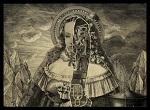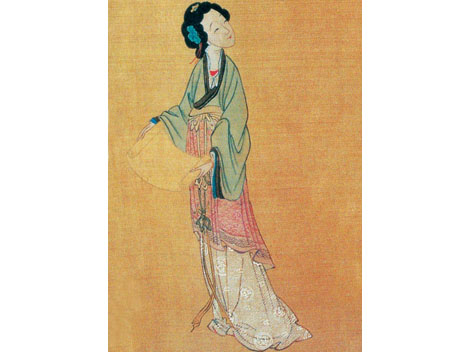|
|
|
Programme et séances saison 2 - 2015-2016 > Séance 8 - Jeudi 12 mai 2016 - L’espace vu d’AsieJeudi 12 mai 2016 (à l'EHESS, salle du conseil A, R-1, bât. Le France, 190 av de France 75013 Paris) L’espace vu d’Asie (Interventions en anglais, les questions pourront être posées en français)
What is Normal and what is Right: Grand Matron Cao and the Women of the Astral Sciences in China, 1st – 4th cent. CE
Résumé: Grand Matron Cao 曹大家(c. 45 – c. 117 CE), née Ban Zhao 班昭, is primarily remembered for having authored the Admonitions for Women (Nü jie 女誡)—a précis of the moral education necessary to prepare a young woman (8–15) for marriage, which, later, in the time of footbinding, would be canonised in the Four Books for Women (Nü sishu 女四書). Less famously, Ban Zhao, upon the death of her brother Ban Gu 班固(32–92 CE), brought his now celebrated history of the Western Han (206 BCE – 9 CE) to completion by compiling its tables and its ‘Monograph on Heavenly Patterns’ (Tianwen zhi 天文志). Informed by the expectations of twentieth-century feminism(s), scholarship on Ban Zhao has focused more-or-less exclusively on the Admonitions and value-laden questions of its conservatism and/or/as disingenuousness—whether or not she really believed headings like ‘Low & Weak’ (beiruo卑弱), in which we moderns, in our transhistorical moral superiority, do not. Grand Matron Cao was a single (widowed), elder literata widely recognised in classical scholarship and the astral and mathematical sciences; to understand Ban Zhao the woman, we argue, one must look beyond her writing on girls to her writings on history and celestial mechanics and to the institutional and political context within which it was conducted. That context, we emphasise, was one that was very much oriented by and towards the ‘lower & weaker’ sex. Namely, Ban Zhao was writing in the palace’s Eastern Observatory (Dongguan 東觀), which Empress Deng (b. 81; r. 106–121 CE)—herself a well-educated and powerful widow, and Ban Zhao’s former pupil—would develop into a sort of institute for advanced studies, poaching the brightest minds from the Imperial Academy (Taixue 太學) to conduct sweeping research projects under the charter of palace women’s education. Having established a clearer picture of her milieu, we will explore common themes running through Ban Zhao’s writings on astronomy and feminine virtue, at the forefront of which is the tension between ancient wisdom and modern experience, what is ‘normal’ (chang 常) and what is ‘right’ (zheng正). A transversal approach, we argue, is crucial for us to understand how Ban Zhao brings cosmic principles to bear on issues like domestic violence while, on the other hand, interjecting questions of morality into planetary motion. Small Biography Daniel Patrick Morgan is a researcher (CR2) at the laboratory SPHERE, CNRS–Paris 7, and member of the ERC project SAW (Mathematical Sciences in the Ancient World). Trained in paleography and manuscript studies at the University of Chicago (2006–2013), his research focuses on the history of science, religion, sports, and classical scholarship in early imperial China. His projet de recherche, incubated during a postdoc at the ERC project SAW (2013–2015), is to explore the phenomenon of polymathy among early Chinese thinkers to better understand how language, values, and ideas move between seemingly unrelated ‘sciences’ and cultural spheres and, conversely, what the pre-modern mind(s) thought to keep separate, and how.
Lisa Indraccolo is a postdoctoral research fellow in Classical Chinese at the Institute of Asian and Oriental Studies and an affiliated member of the University Research Priority Program ‘Asia and Europe’ at the University of Zurich. She earned her Ph.D. (2010) from Ca’ Foscari University, Venice, with a thesis on the early Chinese ‘sophistic’ thinker Gongsun Long (IV century B.C.). Her current research project “Debate Arena: Argumentation and Persuasion in Warring States Philosophical Discourse” studies the rhetorical techniques of argumentation and persuasion in late pre-imperial and early imperial Classical Chinese received literature (IV century B.C.-2nd century A.D.). Her primary research interest is how communication effectiveness is achieved and enhanced through the deliberate strategic employment of rhetorical devices, grammatical features, and recurring structural patterns in early Chinese argumentative texts. Her main publications include an article studying textual variants between the two main extant editions of the Gongsun Longzi (Master Gongsun Long) (T’oung Pao 99.4-5) and a full-text translation into Italian of Ban Zhao’s (45-c. 116) Nü jie (Admonitions for Women) together with a selection of other imperial treatises on feminine behavior (Einaudi, 2010). |
| Personnes connectées : 1 | Flux RSS |

|


